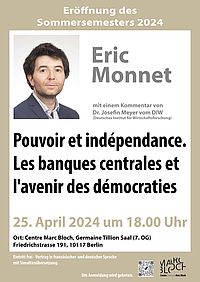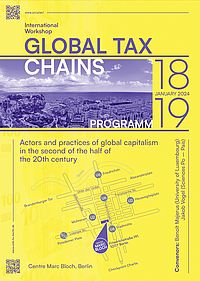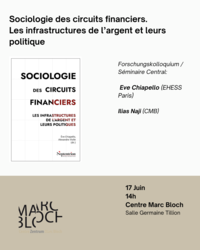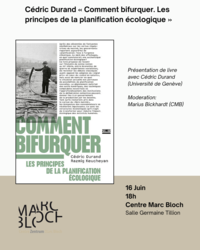Economics cycle
Cycle Économie / Wirtschaftsreihe
With its economics series, the Centre Marc Bloch takes an interdisciplinary approach to key societal issues. In contrast to a perspective that treats economic activities as an autonomous space, the work presented in the economics series aims to reconnect accumulation of capital and markets with their historicity, their embeddedness in societies, their interactions with regulatory institutions and their consequences for living and working conditions. The seminars, conferences and workshops address the issues of legitimising the political order, the dynamics of globalisation, the reshaping of social protection and, ultimately, the model of society and the future of democracy.
Post growth, banks and finance. June 6 and 7 2024
The themes of degrowth and post-growth are increasingly debated in the academic world. Research communities are studying them from a variety of theoretical perspectives and with a variety of objectives. To limit global warming and preserve planetary limits, an empirical consensus is emerging on the need for a significant decrease in the flow of materials extracted, circulated and discharged by economies, which is difficult to separate from a decrease in their GDPs.
A consequent stream of research exists on money and growth, but this literature focuses relatively little on the banking and financial sectors. Yet these sectors play a central role in the creation, destruction and circulation of currencies, which frame the possibility of climate policies (where to find the money? one of the answers lies in money creation, cf. the IRA in the USA). The institutions in these sectors, through their regulatory standards (capital investments according to risk levels) and business models (acceptable risk levels), constrain and direct the volumes of investments earmarked for "green" investments, for example in renewable energies, energy and resource-saving devices and technologies.
Banks are making "green" investments. These are monetary creations aimed at making activities more sustainable. The issue of transforming entire economies according to sustainability criteria is not currently considered by the banking and financial sector. The decline in the material flows of economies, for example, would be accompanied, depending on the sector, by a decline or growth in financing flows from banks and the finance sector. A number of questions can be formulated on the basis of these elements. For the banking and finance sector, they concern:
-the diagnosis of sustainability conditions in relation to material flows and GDP growth,
-the compatibility of sustainability with the business models and profit rates of the banking and financial sectors.
-the interweaving of the banking and financial sectors in the evolution of forms of capitalism "compatible" with the ecological transition.
-methodological and epistemological questions concerning the scientific, political and "future" character of forms of economic organization in the banking and financial sector, as called for by research currents on de/post-growth.
Organised by Ilias Naji
Inaugural conference - Eric Monnet 25th of April 2024 | 18:00

Eric Monnet will present his new publication "Balance of Power. Central Banks and the Fate of Democracy", which will be published in April 2024. The presentation will be held in French and will be commented on by Dr Josefin Meyer from the German Institute for Economic Research (DIW).
International Workshop: GLOBAL TAX CHAINS 18. Januar 2024 | 14:00

Actors and practices of global capitalism in the second of the half of the 20th century
As chains of wealth became global in the world economy (Seabroke&Wigan, 2022) so did tax strategies. These topics have gained increased attention in the last fifteen years as the crisis of 2007/2008 renewed the discussion on inequalities and (fiscal) justice. Humanities and Social Sciences played an important role in framing debates on this topic. Wealth was perhaps less produced by manufacturing cars or building houses than by moving capital across jurisdictions, creating multi jurisdictional spaces where national states, global companies, local financial plumbers and international organisations created, maintained and governed global tax chains. This workshop has a dual purpose. On the one hand, it intends to take stock of these ongoing international and interdisciplinary debates. On the other hand, it intends to deepen the historical dimensions to phenomena that are beginning to be well documented for today's world, but still sometimes lack temporal depth.
Organised by Benoît Majerus and Jakob Vogel at Center Marc Bloch Berlin
Colloquium "Social Innovation" 14. Dezember 2023 | 09:30
The concept of social innovation has become widely accepted over the last two decades in the context of the activities of the OECD and the European Union. While it is defined differently depending on context, many definitions contain a normative approach.
The workshop, which will take place from 9.30 a.m. to 4.30 p.m. at the CMB, is dedicated to the topic of social innovation from the point of view of science and practice from a Franco-German and European perspective. Around ten academics and practitioners will discuss the topic in English. The workshop consists of a keynote speech and two discussion rounds. The keynote speech (Simone Baglione, Università di Parma) will open the topic with a comparative European approach by presenting the various definitions and measures to promote social innovation and setting out the conceptual framework. This will be followed by two discussion rounds on the topics of (i) social inclusion of people with disabilities and (ii) migration and the labour market.

